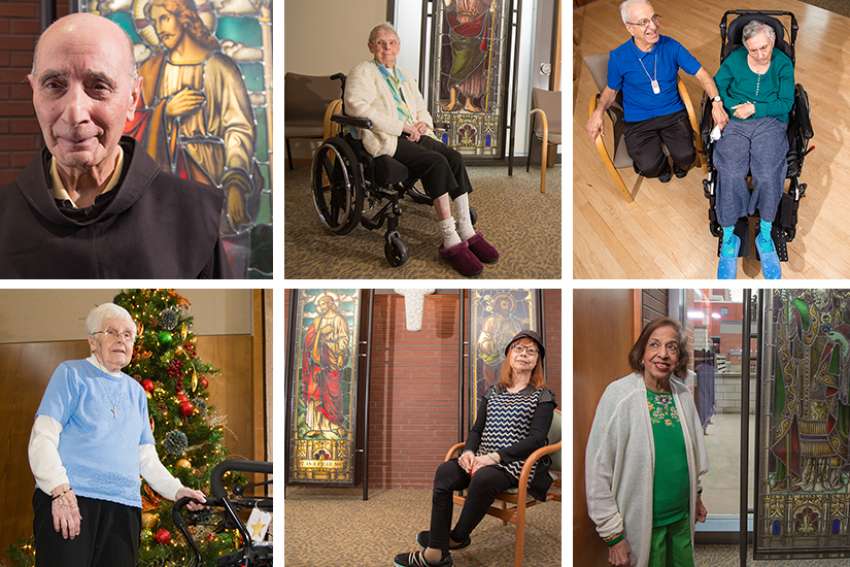Young Michael Adamo, as he was known before he donned the brown Franciscan habit, didn’t really think he had a vocation. He knew he didn’t want to follow his brothers into the family grocery business.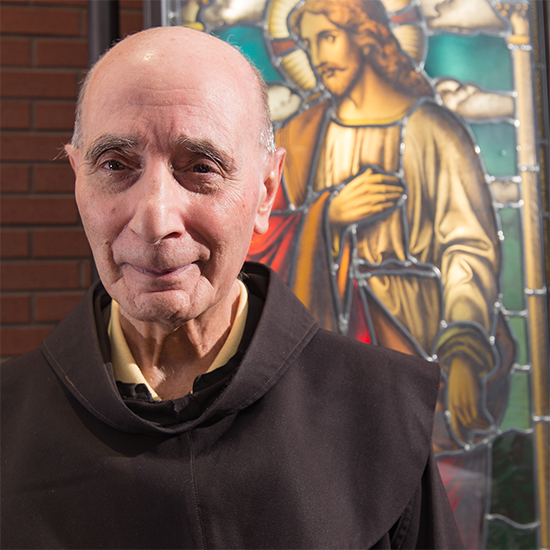 “I had had enough of the Italian fruit business and whatnot,” said Adamo.
“I had had enough of the Italian fruit business and whatnot,” said Adamo.
He was uncertain about what exactly a brother is and does, but he knew he wanted to try something different.
“I guess maybe I must have seen the habit and fell in love with the habit,” he said.
When that first Christmas away from his family rolled around, Adamo was ready to be amazed. The novitiate was located in a big, new building on top of Mount Alvernia.
“They would decorate the whole building — light up the whole building so in the surrounding area you could see it from all over,” Adamo said.
Seminarians began the preparations, including dipping the light bulbs in paint, as early as September. It was just a taste of what was to come.
“It was Christmas Eve, the night Mass. The clerics were singing — beautiful, because they had a professional teacher at the time on the staff. The altar was beautifully decorated,” said Adamo. “It was so dramatic, when they removed the veil from the infant Jesus. It was just a feeling for me, because it was all new. Everything was brand new. It was so memorable, I could just never forget.”
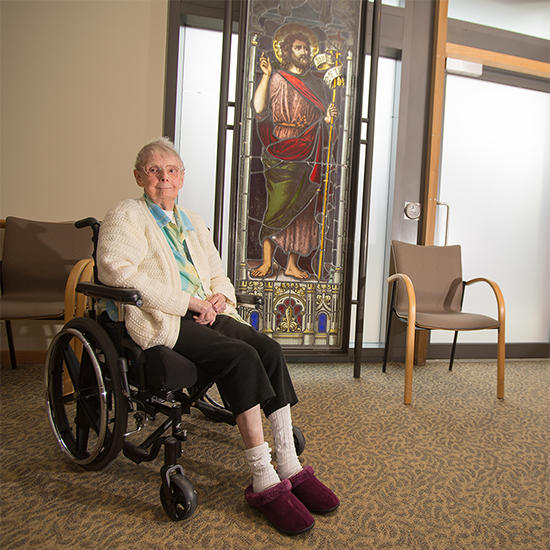 At 95, Sr. Mary Francis Feener’s mind drifts back to Halifax in the 1920s when the Sisters of Charity would prepare her, her five sisters and one brother for Christmas.
At 95, Sr. Mary Francis Feener’s mind drifts back to Halifax in the 1920s when the Sisters of Charity would prepare her, her five sisters and one brother for Christmas.
“They taught us that during Advent, when you do a good deed you put a straw in the manger so you made it comfortable for the Lo
rd Jesus,” said Feener.
Feener’s ministries over the years took her across Canada, where the sisters would prayerfully celebrate Christmases.
While Feener treasures her memories of simple, happy childhood Christmases, she’s not too quick to pounce on the materialism and distractions of modern Christmases. “I admire the people of today,” she said.
Among her caregivers at Providence, she sees people who work hard to give their own families a good Christmas. She also sees how the staff support one another. “I think it’s different today,” she said.
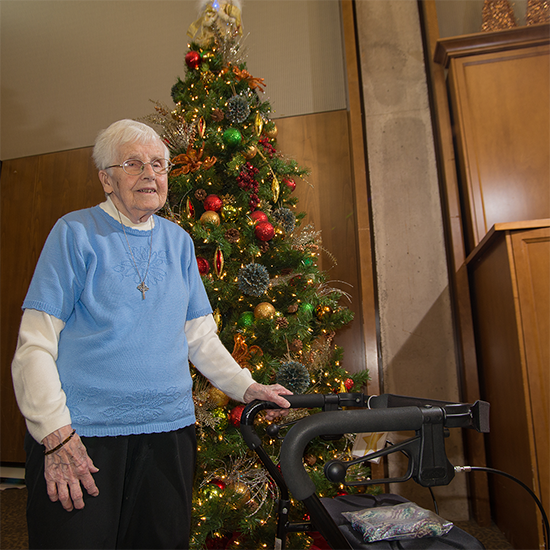 Sr. Elizabeth Babin remembers the Christmas trees of her childhood in Yarmouth, N.S.
Sr. Elizabeth Babin remembers the Christmas trees of her childhood in Yarmouth, N.S.
“Presents? We weren’t that rich,” said the 98-year-old. “Anyway, we had a beautiful tree. I always felt we had the most beautiful tree in the village.”
After she entered the Good Shepherd Sisters, Christmas away from home was never quite the same.
“They tried to make it nice. It wasn’t bad, but it wasn’t home,” she said.
Of course religious life meant thinking of Christmas in a new light.
“You have to think of what Christmas really means — why we have Christmas,” she said.
“It’s not just a jolly old time. No. It’s a great event that Jesus was born, our saviour, to save us, to keep us, to be with us the rest of our lives.”
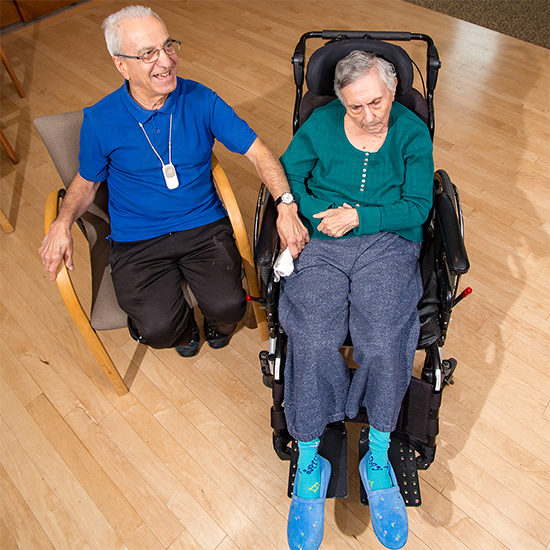 For Vito Silvestri, 85, Christmas Day at the Houses of Providence will just be another day to love his wife Ottavia. He will arrive in the morning, say “hello” and “Merry Christmas” to the staff and volunteers at Providence who have become his friends. He will spend a little time with Ottavia and then help her to eat her lunch.
For Vito Silvestri, 85, Christmas Day at the Houses of Providence will just be another day to love his wife Ottavia. He will arrive in the morning, say “hello” and “Merry Christmas” to the staff and volunteers at Providence who have become his friends. He will spend a little time with Ottavia and then help her to eat her lunch.
“I come here every day to feed her, because she needs the feeding,” he said. “She takes long, because her mind doesn’t tell her to open the mouth — sometimes yes, sometimes no.”
Ottavia’s dementia has been through several stages until today she cannot speak and is confined to a wheelchair. Providence has become Vito’s second home.
The retired cabinet maker used to build a Christmas Nativity scene for the residents and staff on the fourth floor. It’s a tradition he brought with him from the town of Modugno, 421 kilometres southeast of Rome, where he began learning his trade at the age of nine.
When he got to Toronto in 1955, he and the other Italian cabinet makers were still building creches every Christmas. After he and Ottavia married in 1960 he built Christmas creches every year for his children.
Until very recently, Vito applied his craft to Christmas, carving and lacquering figurines that retold the story of the birth of Jesus.
“Because I’m old now, I don’t want to do any of that,” he said.
When things get down to their essentials, on Christmas Day Vito will sit with Ottavia, holding her hand, gently raising a spoon to her mouth, talking quietly with his love.
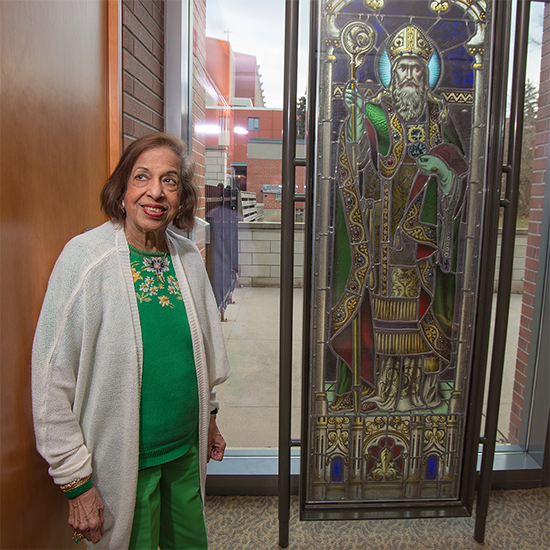 Lyra Gomes, 87, especially remembers big family Christmas celebrations in Bombay (long before the Indian metropolis became Mumbai). In the 1950s, Gomes was running a successful fashion business. When she inherited the store from her father-in-law it was called Modern Drapers.
Lyra Gomes, 87, especially remembers big family Christmas celebrations in Bombay (long before the Indian metropolis became Mumbai). In the 1950s, Gomes was running a successful fashion business. When she inherited the store from her father-in-law it was called Modern Drapers.
“I said, ‘Oh, I don’t like that name.’ I changed it to Lyra’s Fashions,” she said.
The Goan Catholics in Bombay stuck together, a network of big, interlocking families. When they got together at one of their houses for Christmas there would never be less than 50.
“We had big Christmases in Bombay,” said Gomes. “Families always got together.”
After coming to Toronto, Christmases got a little more subdued.
“It’s too expensive to have anything here,” she said.
But no matter what, there was always food. “I’m a good cook,” she said. “I make a lot of food — Indian, Punjabi, Goan, Irish, English, any kind of food.”
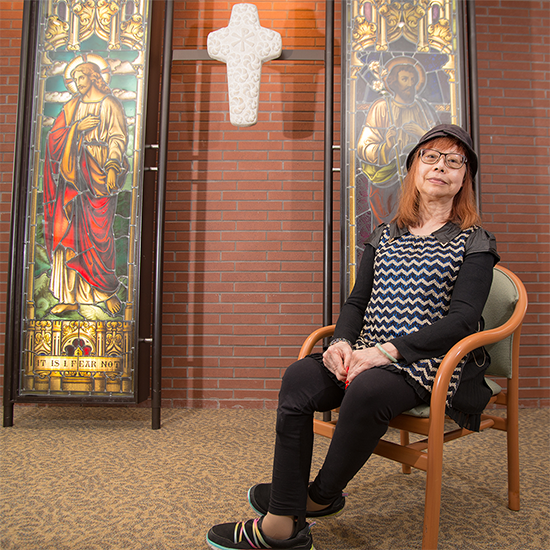 Janny Chung, 69, hangs onto a Christmas memory that many might think would be too painful.
Janny Chung, 69, hangs onto a Christmas memory that many might think would be too painful.
“There was a very special Christmas when my parents were both diagnosed with cancer. It would be our last Christmas together,” she said.
Like many Hong Kong immigrants, Chung’s family made it to Canada during the 1980s in stages. First her brother came, then her and her sister and finally their parents. The brother’s home in St. Lambert, Que., one of the mainland suburbs of Montreal, became the gathering place for the whole family. The two successive cancer diagnoses and two surgeries in one year made for a sobering Advent.
“We all knew that it would be the last Christmas. It would be very special because Christmas is the time that Christ was born. We treasured it a lot,” Chung said.
Neither of Chung’s parents had ever had an introduction to any religion, but they worked hard to send their children to Hong Kong’s good-quality Catholic schools.
“I still remember that we gathered in the Church (that last Christmas),” Chung said. “My parents, even though they have no religion, they believed in that. They were good people…. We accepted the fact that they will be leaving us soon. We were still with a cheerful heart.”


